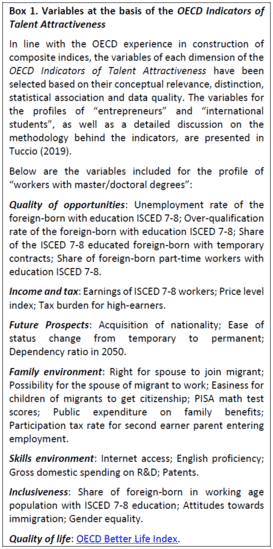Stay in the loop! Subscribe to our mailing list
OECD has developed a set of indicators to measure the attractiveness of OECD countries in attracting and retaining international talent. This is the first comprehensive tool to capture strengths and weaknesses of OECD countries in attracting and retaining talented migrants, and in three specific categories:

The OECD indicators measure in 7 specific categories (variables per indicator in the table on the left-hand side): quality of opportunities; income and tax; future prospects; family environment; skills environment; inclusiveness; and, quality of life.
Against complex weighted indicators, the attractiveness of countries will vary by dimension and users of the tool can make the ranking based on their own preferences. However, the results presented here are based on equal weights and as such point to the most attractive OECD countries for the three target groups in the seven dimensions, as follows.
The most attractive OECD countries for highly qualified workers (ISCED 7 or 8) are Australia, Sweden, Switzerland, New Zealand and Canada, in contrast with Israel, Japan and Turkey at the bottom of the list. The main factors are favourable labour market conditions and a good skills environment for highly skilled workers.
For entrepreneurs, the most attractive countries are Canada, New Zealand, Switzerland, Sweden and Norway, mainly in terms of the minimum capital investment and job creation requirements.
When it comes to international students, the score changes slightly to include Germany and Finland in addition to the US, Switzerland and Norway. Some other countries, like Canada, Australia and the UK, fall down due to high tuition fees.
The overall conclusion is that the OECD countries could do much better in attracting and retaining international talent at global level. Overall, admission criteria are seen to be a strong factor when deciding on a country’s attractiveness, together with the tuition fee levels and possibility to work while studying when it comes to international students. Concerning the question of brain-drain, the study points out that “a significant part of the competition for talent is currently between G20 countries”, and not necessarily from the “less developed” ones, which are considered more vulnerable.

Source: OECD Migration Policy Debates, N19, May 2019
More information here
More information on Indicators here